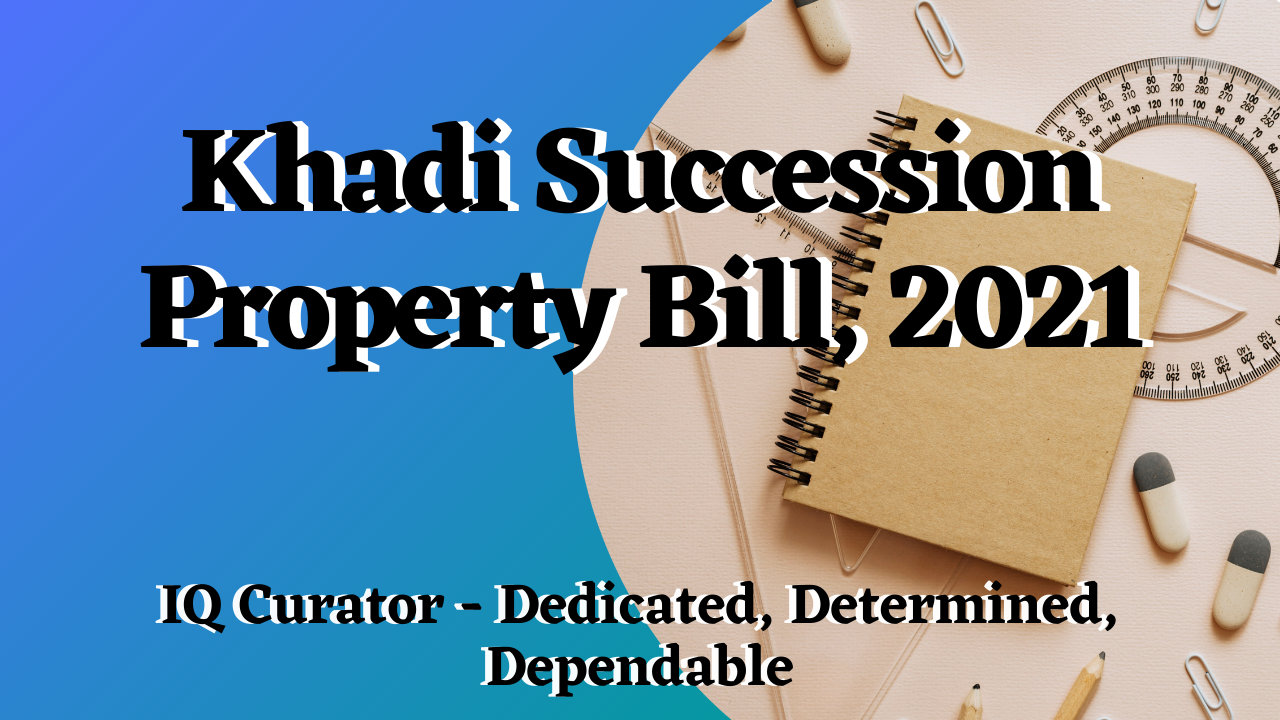The Khasi Hills Autonomous District Council (KHADC) in Meghalaya recently announced that it will introduce the Khasi Succession Property Bill, 2021. The purpose of this bill is to "distribute ancestral property" equally among the brothers and sisters of the Khasi community.
If enacted, the proposed bill would amend the years-old practice of inheriting the maternal Khadi tribe.

(Khadi-Succession-Property-Bill,-2021)

(Khadi-Succession-Property-Bill,-2021)
Khadi Succession Property Bill, 2021
Note:
- Khasi Hills Autonomous District Council (KHADC) is an organization under the Sixth Schedule of the Constitution.
- It does not have the authority to make laws.
- Article 12A of the Sixth Schedule gives the state legislature the final right to pass legislation.
- The Sixth Schedule of the Constitution provides for the administration of tribal areas to protect the rights of the tribal population in the states of Assam, Meghalaya, Tripura and Mizoram.
- This special provision has been made under Article 244 (2) and Article 275 (1) of the Constitution.
- It grants autonomy to the administration of such territories and has the right to make laws in respect of the territories under its jurisdiction through the Autonomous District Councils (ADCs) in May.
Main points
About the mother line system of inheritance:
- The three tribes of Meghalaya - Khadi, Jayantiya and Garo - study the maternal lineage system of inheritance.
- In this system the lineage and the descendants of the lineage mother are traced.
- In other words, the children take the mother's surname, the husband goes to his wife's house, and the youngest daughter of the family (Khatduh) is given the entire share of the paternal or clan property.
- Khatduh becomes the “custodian” of the land and assumes all the responsibilities associated with the land, including caring for aged parents, unmarried or destitute siblings.
- This tradition of inheritance only applies to ancestral or clan / community property, which has been with the family for years. In addition, the self-acquired property can be evenly distributed among brothers and sisters.
- In this traditional system if a couple does not have a daughter, then the property is handed over to the wife's elder sister and her daughters.
- Usually on this caste property if the wife does not have a sister take possession.
- Impact of this system on women empowerment: Women do not often notice that the metric system in Meghalaya rarely empowers women.
- Problems of parenting: Parenting is often misunderstood because ownership belongs only to the person who is the youngest daughter.
- This parenting comes with the responsibility of caring for elderly parents, unmarried or destitute siblings and other family members.
- Also, conservators cannot buy or sell land without their uncle's permission. (Uncle: Mother’s Brother)
- Maternal lineage: People are often confused about the word patriarchy, where women play a leading role.
- Where women work primarily, women have easy access to mobility and freedom of education, but in Meghalaya women are not in a decision-making role.
- There is hardly a woman in a position of power in politics or in a large organization.
Back to basics: About the bill
Provision:
- The proposed bill envisages "equal distribution of ancestral property" between male and female siblings.
- The bill would give parents the right to decide who wants to name their property.
- The bill prohibits non-Khadi marriages, acceptance of spousal customs and culture, and prevents siblings from acquiring ancestral property.
- The purpose of the law is economic empowerment based on the principle of equal distribution of wealth.
- Bill required: Some groups have opposed the property inheritance system that has been in place for years, saying it "disintegrates" men and forces all children in the family to distribute the same property.
- Impact: It will improve the age-old practice of maternal khadi tribe and heritage.
Welcome to IQ Curator’s General Knowledge - All Competitive Exams Questions - Answers Section. This section is a various topics & category-wise archive of IQ Curator’s GK (General Knowledge) Questions – 2021-2022 in Short MCQs format on various subjects and states. This section is suitable for aspirants preparing for UPSC-IAS, SSC-CGL and State Level Examinations of various states and also UPSC conducted NDA/ CDS/ IFS/ IES / CSE, SSC, Banking / IBPS, IAS, NTSE, CLAT, Railways, NDA, CDS, Judiciary, UPPSC, RPSC, GPSC, MPSC, MPPSC ,etc. examinations.
Please Click Here for : IQ Curator - Recommendation of the National Human Rights Commission (NHRC’s) on Police Reforms
You may also Click Here for : General Knowledge - All Competitive Exams
Good Luck!

